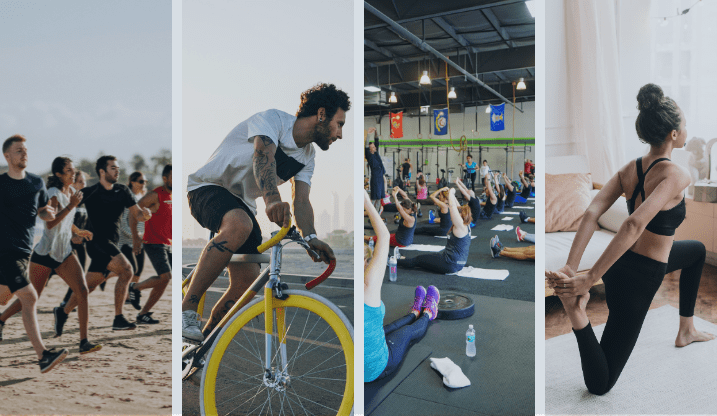Healthy habits are the cornerstone of a thriving life, influencing everything from our physical strength to mental resilience. We all know how important it is to develop and commit to a healthy lifestyle. And yet despite our best intentions, many of us struggle to maintain healthy habits over the long term. We might start strong at the beginning of a new year or after some kind of life event and wake-up call, but most of us can quickly lose momentum as life’s demands pull us in different directions.
The best workdays for me begin with getting up early and enjoying 30 minutes of reading, prayer and meditation over a good cup of coffee, and a 30-minute workout before I hit the computer. I’ve been able to maintain these habits and save the space and time for the better part of my workdays for several years now. But I find that early morning meetings or a disruption in my routine, like returning from an amazing vacation, make it hard to get back into these daily habits. I’m struggling with this as I write this blog, so I’m hoping that by doing so, I’ll commit to going back to that routine or even mix it up with some new habits. So let’s dig in.
First, it’s important to point out that healthy habits aren’t one-size-fits-all; they’re as unique as you are. By understanding how your personality traits influence your preferences and behaviors, you can choose activities that align with who you are, making it easier to stay committed and motivated in the face of challenges.
As individuals, we’re more likely to develop and keep healthy habits when we honor our individuality. Whether you’re an assertive go-getter or an introspective analytic, knowing your unique traits can help you shape your approach to wellness and adopt practical strategies that leverage your strengths to create a sustainable healthy lifestyle.
Tapping into your personality traits to develop consistency in your health habits.
1. Self-Awareness and Alignment
Recognizing your unique personality traits helps you seek and find healthy habits with activities that resonate with you personally. This alignment increases the likelihood of enjoyment and engagement, making it easier to stick with these habits over time.
2. Motivation and Consistency
When we engage in activities that align with our personality traits, we are more likely to feel motivated and enthusiastic about maintaining those habits. This motivation promotes consistency, as we are less likely to view the healthy habits as chores or obligations.
3. Resilience and Adaptability
Different personality traits come with unique strengths and challenges. By understanding our own traits, we can anticipate potential obstacles to healthy habits and develop strategies to overcome them. This adaptability enhances resilience and reduces the likelihood of giving up in the face of setbacks.
4. Social Support and Connection
Personality traits influence social preferences and interaction styles. Engaging in healthy activities that align with our primary personality traits facilitate social connections with like-minded individuals, providing support and accountability in maintaining those habits over the long term.
5. Sustainable Lifestyle Integration
Healthy habits that are tailored to our individual personality traits are more likely to become integrated into our daily life seamlessly. Rather than viewing these habits as separate tasks, we see them as natural extensions of our lifestyle, making them easier to sustain over the long term.
The Omnia Behavioral Assessment measures 4 distinct personality traits — assertiveness, communication style, pace and structure. There’s a lot that goes into each of these traits that you can read about here. Our employee behavioral assessment reports display an individual’s results in the form of columns. The taller a column is in one trait, the lower the opposing column is in the opposite trait. The taller columns are considered primary traits, and this is where you want to focus when it comes to leveraging your strengths and considering those health habits that align most closely with your preferences.
Let’s take a closer look at these personality traits and the kinds of health-related activities that may best align to each. These examples are intentionally written in extremes. We all typically possess a combination of these characteristics. It’s important not to fall prey to a stereotype but lean into your primary and unique traits to embrace your strengths.
Level of Assertiveness:
If you have a high level of assertiveness (Column 1), you may prefer activities that challenge you and allow you to take charge, such as competitive sports or high-intensity interval training. You may also commit more to goal-oriented activities like 5k’s, triathlons or endurance testing obstacle races.
People with less assertive, more supportive traits (Column 2) might lean toward activities where they can follow along without feeling pressure, such as group fitness classes or hiking with friends.
Social vs Reserved:
Those who are on the more social side of the spectrum (Column 3) might enjoy activities that involve social interaction and group dynamics, such as team sports, group fitness, dance or even cooking classes. If you are more reserved (Column 4), you might prefer solo activities or smaller group settings, such as solo hiking, swimming, yoga and meditation — either alone or in a quiet studio.
Analytical vs Intuitive Decision Maker:
Analytical decision makers (Column 4) could be drawn to activities that require focus and strategy, such as chess, rock climbing, or problem-solving workouts like obstacle courses.
If you’re on the more intuitive or “go by your gut” side of the curve (Column 3), you may gravitate toward activities that allow you to express yourself and connect with your emotions, such as dancing, painting, or journaling.
Fast Paced vs Methodical:
If you prefer to move at a fast clip and enjoy a variety of options at all times (Column 5), you could thrive in a mix of dynamic activities including cycling or high-intensity interval training. But if you prefer a more methodical approach when working toward that sense of accomplishment (Column 6), you could find yourself gravitating toward a book club or activities that allow you to focus on precision and technique, such as ballet, yoga, tai chi, or swimming laps.
Autonomous vs Structured Rule Follower:
Those who have a high preference for independence and autonomy (Column 7) may most enjoy activities where you can set your own pace, schedule and goals, such as solo jogging, hiking, or exploring nature trails. And those who prefer more structure and love rules and guidelines (Column 8) may suit best with scheduled group fitness classes, martial arts, and anything that requires following a structured workout plan.
By understanding these personality traits and preferences, you can choose activities that align with your natural tendencies, making it easier to adopt and maintain healthy habits in the long run. This personalized approach ensures that healthy habits become enjoyable and sustainable parts of your lifestyle.
Healthy habits aren’t just beneficial for personal well-being; they also enhance productivity and performance in the workplace. When individuals prioritize self-care and maintain healthy habits, they experience greater focus, creativity, and resilience. Physical activity boosts energy levels and cognitive function, while mindfulness practices improve concentration and decision-making. As leaders, we need to support our employees and encourage them to carve out time to prioritize their mental and physical health. The companies that thrive and grow are the ones that create a workplace culture committed to recognizing and supporting their employees’ dedication to a healthy lifestyle. And there’s a great return on this investment — your teams become and remain more effective and efficient in their professional endeavors, leading to greater success and satisfaction.
By leveraging personality traits to select and adapt healthy habits, you can create a personalized approach to well-being that is enjoyable, sustainable, and ultimately contributes to long-term health and happiness. I’m signing off now so I can get to that workout that I missed due to a breakfast meeting this morning. But before I do, let me tell you how you can get started on the path to knowing your unique traits: try our complimentary behavioral assessment and a member of our team will contact you to debrief your results.























